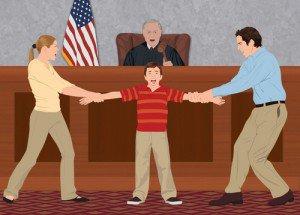Child Representatives in Child-Related Court Proceedings
 Any legal matter related to children can quickly become emotionally charged and fraught with challenges. Parents, especially those going through a bitter divorce or separation, can often have trouble remaining objective and keeping their child’s best interest a priority. In such cases, the court may choose to appoint an independent attorney as a Child Representative to serve the child’s needs without emotional complications.
Any legal matter related to children can quickly become emotionally charged and fraught with challenges. Parents, especially those going through a bitter divorce or separation, can often have trouble remaining objective and keeping their child’s best interest a priority. In such cases, the court may choose to appoint an independent attorney as a Child Representative to serve the child’s needs without emotional complications.
Child Representative Situations
Frequently in child custody, support, and visitation cases, the interested parties are dealing with a number of contentious issues related to the end of a marriage. Unmarried couples, as well, may struggle to remain civil as the end of any relationship can lead to feelings of anger, betrayal, and confusion about the future.
Negotiations regarding a couple’s children may start amicably but too often deteriorate into an ugly situation in which neither parent will compromise. The focus of the case may become clouded while “winning” and “losing” gain more importance than the well-being of the child. A situation like this may necessitate the court to appoint a Child Representative who is tasked with acting on behalf of the child’s best interests.
Role of a Child Representative
To be appointed as a Child Representative, an attorney must undergo training and obtain the appropriate qualifications and certifications required by respective jurisdictions. When selected in such a capacity, the Child Representative is granted investigative powers to gather information pertinent to the case. As part of the process, he or she will interview the child, the parents, and any other parties, review financial records, court documents, and other appropriate data. The child’s wishes must be considered, but only as part of the overall case, and they are not binding.
Based on the results of the investigation, the Child Representative will prepare a recommended course of action for the best interest of the child. He or she is then expected to advocate that position in any related proceedings, either through litigation or alternative dispute resolution. The Child Representative, unlike a Guardian ad Litem, may not be called as a witness. Instead, he or she becomes a party to the case, acting on behalf of the child’s best interest.
If you are involved in any legal matter related to your children and a Child Representative has been appointed in your case, it is important that you seek legal counsel of your own. Contact an experienced Geneva family law attorney today. For more than 30 years, Attorney Doug Warlick has been helping clients protect their children in all areas of family law and is ready to put that experience to work for you.






